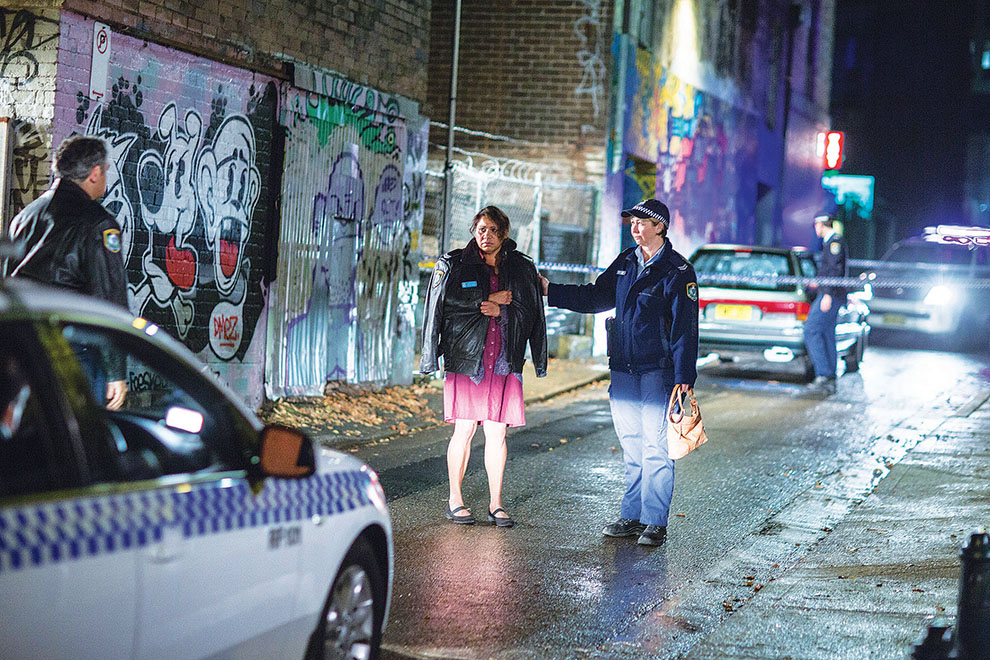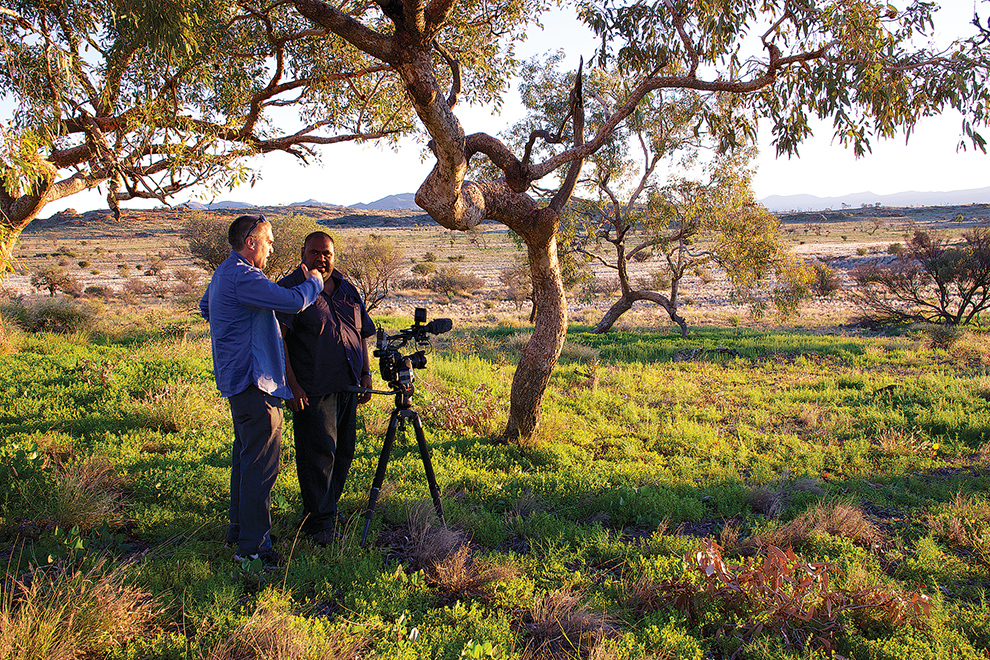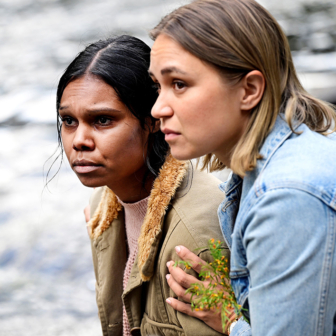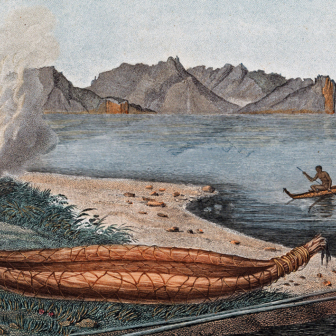It’s a windy mid-week morning. The trains roll in and out of Redfern Station and a stream of commuters pours up the concrete steps. Coffees are bought, phone calls made and received. Students – all backpacks and earplugs – head reluctantly along Lawson Street towards their lectures at Sydney University.
Meanwhile, down the hill, on Eveleigh Street – known to all of Sydney as The Block – a strange tribe is camped out opposite a nondescript terrace. Nestled in the shadow of a huge Aboriginal flag painted on a nearby wall, they are engrossed in a collective act of intense concentration. They wear the internationally recognised costume of their clan: baseball caps and padded jackets. Some are sitting under a white marquee that wobbles gently in the breeze; others manoeuvre a shadecloth into position over a camera on a tripod.
The focus of their attention: two Indigenous men chatting on the footpath. A young guy glides by on a skateboard; a woman weighed down with shopping passes along the street. Suddenly one of Australia’s most famous Aboriginal actors steps out of the terrace. Deborah Mailman talks for a brief moment to the younger of the two men, then strides off.
A quiet voice says, “Okay,” and everything stops. Sitting under the marquee wearing earphones and watching a video monitor is the controlling mind of all this humming energy: the award-winning Indigenous director Rachel Perkins. With minimal fuss, the camera is moved. The actors and extras go back to “first positions.” The choreography is repeated.
It’s been raining in Sydney for the past week, and the crew producing a new telemovie for the ABC are making the most of some rare, blessed sunshine to film exterior scenes. The film they are making is Promise Me, the much-anticipated final chapter of the landmark drama series Redfern Now. Like the rest of the series, it’s being made by Blackfella Films, and is produced, directed and written by Indigenous Australians.
Sitting behind Perkins on a fold-up chair is an Indigenous man in his forties with close-cropped, greying hair. He’s the man who hit the computer keys to write the script that had brought forth all this activity. His name is Steven McGregor.
Redfern is changing. For forty years this small patch of Sydney has been the most famous Aboriginal stronghold in the city, and the first port of call for blackfellas visiting from the country. But the overheated Sydney property market brooks no opposition as it thunders across the city’s landscape like a laissez-faire tornado.
The row of terraces that formed the heart of The Block has been demolished by the Aboriginal Housing Company, which plans to redevelop the site into offices, retail buildings and student accommodation. On the day I visit, there’s a little tent village of Aboriginal protesters decrying the loss of low-income housing for Indigenous people and intent on stopping the plan.
Sitting on the same site, in amiable proximity to the protesters, is the nerve centre of the Promise Me production – half a dozen caravans drawn into a square. It is here that I sit down to discover how the Darwin-based Steven McGregor ended up in wintry Redfern.
As a young man, just out of school and on the dole, McGregor was kicked off the couch by his mother and sent into town to apply for a job. He became a production assistant in a video unit attached to the NT Chief Minister’s Department, and spent six years travelling around the Territory making videos explaining government policy for use in Aboriginal communities. When he wasn’t being made to do the washing up, he began to learn how to use a camera and edit.
By the 1990s he was working in Alice Springs at CAAMA Productions with the likes of the young cinematographer Warwick Thornton, who went on to direct the internationally renowned Samson and Delilah. McGregor’s apprenticeship days were coming to an end. “We were hungry to learn and tell stories, and we all sort of grew together,” he says of those times in Central Australia.
He began to work on documentaries as a cameraman and editor. Even losing an eye in a local hockey game didn’t stop him; he simply shifted to directing earlier than he’d planned. He trained at the prestigious Australian Film, Television and Radio School and started writing, pretty much because there was no one else to do it for him.
He made films about Australian Rules and the Tiwi Islands; about the life of George Burarrwanga, lead singer of trailblazing Aboriginal rock group the Warumpi Band; and about the epic trek of ninety-five Indigenous kids and their carers from the Croker Island Mission, 200 kilometres north of Darwin, all the way to faraway New South Wales in the wake of the bombing of Darwin. He even worked on Baz Luhrmann’s outback epic, Australia. And he still makes documentaries; his latest is the second, three-part season of Art + Soul, a TV series about contemporary Aboriginal art.
And then, in 2010, he got a call to come to Sydney and meet the British writer Jimmy McGovern.
A working-class Liverpudlian, the BAFTA award–winning McGovern is a legend in the world of TV drama. He doesn’t do costume dramas or irony, he does life. And he wants the best from the writers he works with. He wants something truthful from them.
McGovern broke into writing by working for the above-average British soapie Brookside. He created the hit series Cracker, which starred Robbie Coltrane as Fitz, the hard-living, crime-solving psychologist. In the mid 2000s he wrote The Street – a series of stand-alone stories about ordinary families, living on the same ordinary suburban street, whose lives are upended by a single extraordinary event.
The Street didn’t go unnoticed in Australia. After she was appointed to the newly created position of head of ABC TV’s Indigenous department in 2010, the Aboriginal film-maker Sally Riley had the idea of inviting McGovern to Australia to work with emerging writers on an Indigenous version of the series. McGovern eventually became the story editor and a creative midwife on Redfern Now.

Deborah Mailman in the final, feature-length episode of Redfern Now, Promise Me. Mark Rogers
All his experience in documentaries had taught Steven McGregor the necessity of finding a story’s “emotional core, something that an audience can feel.” But he was still nervous about meeting the creator of The Street. “Wow, I’d never seen anything like it in my life,” he tells me. “For me and the other writers, and the producers, it became a big reference point, a jumping-off point.”
McGregor remembers an early meeting when the writers gathered to discuss their ideas with McGovern. “We all sat around a table. I think everyone was waiting to get called out as a fraud and asked to leave the room,” he says, laughing.
By all accounts McGregor rose to the challenge of McGovern’s mentorship. So what did he learn?
“Jimmy said, ‘Pick a character and torture them,’” McGregor explains with a sparkle. Take an ordinary person, set them a moral test, then crush them with the weight of it – that seems to be the McGovern Method. McGregor also recalls that McGovern was generous, enthusiastic and open to ideas – but tough when he needed to be. “He’ll tell you if it’s shit as well. He’ll jump on you. ‘That’s just furniture,’ he’ll say. ‘What’s it doing there?’ It can be pretty exhaust- ing, but exciting too.”
Under McGovern’s tutelage McGregor wrote four of Redfern Now’s twelve episodes; and one of them – the story of a guilt-ridden Indigenous policeman, titled Pretty Boy Blue – earned him an AACTA award for best television script in 2013.
The last Redfern Now episode, Promise Me, tells the story of two women who are violently attacked by the same man but respond in very different ways. “It’s the story of an older woman teaching a younger woman to be strong, to stand up for herself, to be proud of who you are even when the world tumbles down around you,” McGregor explains.
It mixes together several characters from the earlier series of Redfern Now. Deborah Mailman plays Lorraine, one of the attacked women. The actor and director Wayne Blair, probably best known for directing The Sapphires, reprises his role as the local Redfern cop, Aaron. Rarriwuy Hick plays Robyn, his daughter, the other victim of violence. Kelton Pell and Lisa Flanagan, the stars of the recent ABC drama The Gods of Wheat Street, return as Raymond and Allie.
The remarkable group of Indigenous actors, writers, producers and directors on Redfern Now also has many Indigenous peers working elsewhere in the industry. It’s like Steven McGregor’s formative experience in Alice Springs all those years ago – the diversity of projects and the chance to try different roles – but writ large, on a national scale.
Compare the working lives of the Redfern Now generation of Indigenous artists to the pioneering men and women depicted in Darlene Johnson’s recently broadcast documentary The Redfern Story. Johnson’s film records the little-known but important history of Redfern’s National Black Theatre, which was founded by the late Bob Maza in the radical 1970s. It was the Redfern Now of its day – a chance for black playwrights to work with black actors and producers.
In 1975, for example, the National Black Theatre premiered the late Robert Merritt’s landmark work The Cake Man; it was the first Indigenous play to tour overseas and the first to be published. On opening night Merritt famously took his seat in the theatre accompanied by two police officers. The proud playwright was on special release from Long Bay. Though its achievements were great, the company’s existence was always hand-to-mouth.
It’s not all that long since an Indigenous career journey like Steven McGregor’s would have been hard to imagine. After Promise Me wraps he’s got more documentary projects “bubbling along,” he says, and he’s written a feature, an Australian western set in 1930s Alice Springs, that he’d love to make. It’s a long way from being up to your elbows in soapsuds doing the dishes in the video unit of the NT Chief Minister’s Department. •
Promise Me is scheduled for screening on ABC TV in 2015.




